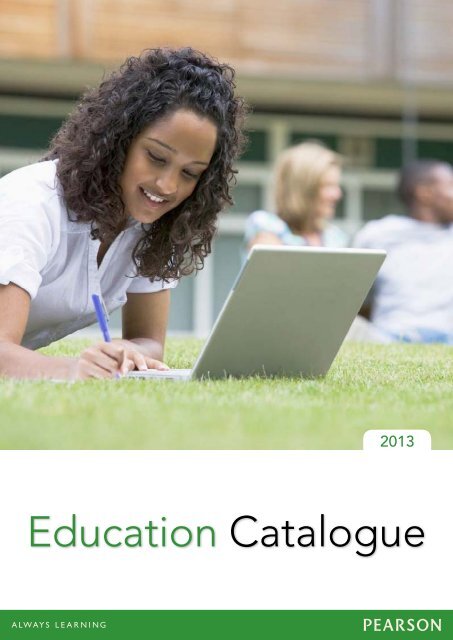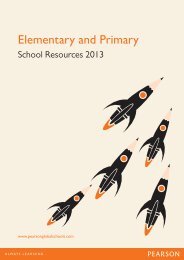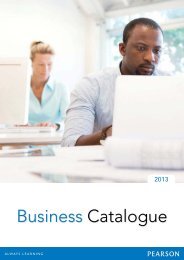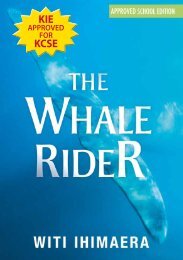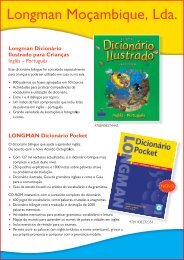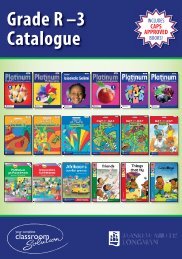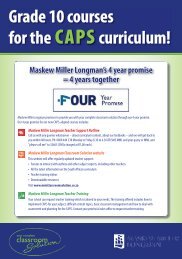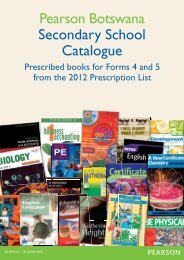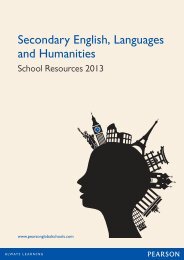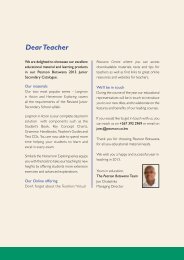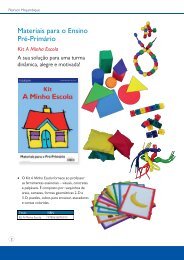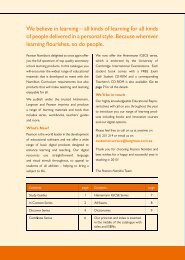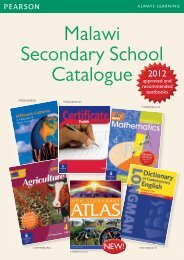Education Catalogue - Pearson
Education Catalogue - Pearson
Education Catalogue - Pearson
You also want an ePaper? Increase the reach of your titles
YUMPU automatically turns print PDFs into web optimized ePapers that Google loves.
2013<br />
<strong>Education</strong> <strong>Catalogue</strong>
Dear Lecturer<br />
Welcome to <strong>Pearson</strong>’s 2013 digital <strong>Education</strong> <strong>Catalogue</strong> of<br />
local publications. We know that change can be invigorating<br />
and we are excited to introduce our new catalogues available<br />
on our local website www.pearson.co.za.<br />
In these catalogues, <strong>Pearson</strong> continues to offer you a broad<br />
selection of local publications. We invite you to explore our<br />
interactive catalogue, which is divided into the following<br />
categories:<br />
∙ Teacher Training<br />
∙ Early Childhood Development & Foundation Phase<br />
∙ Home Learning<br />
∙ <strong>Education</strong>al Psychology<br />
∙ <strong>Education</strong> in South Africa<br />
∙ <strong>Education</strong> Management<br />
∙ <strong>Education</strong> Leadership and Human Resources<br />
∙ Teaching Method: History<br />
∙ Adult <strong>Education</strong><br />
∙ Philosophy of <strong>Education</strong><br />
Table of Contents<br />
Category<br />
Page<br />
Custom Publishing 3<br />
Technology Solutions 4<br />
Instructor Resources 5<br />
<strong>Pearson</strong> Guide to Sampling<br />
and Prescribing Textbooks<br />
<strong>Education</strong> 8<br />
Teacher Training 8<br />
Early Childhood Development<br />
& Foundation Phase<br />
7<br />
12<br />
Home Learning 14<br />
<strong>Education</strong>al Psychology 16<br />
<strong>Education</strong> in South Africa 19<br />
<strong>Education</strong> Management 21<br />
<strong>Education</strong> Leadership and<br />
Human Resources<br />
24<br />
Teaching Method: History 25<br />
Adult <strong>Education</strong> 26<br />
Philosophy of <strong>Education</strong> 28<br />
<strong>Pearson</strong> Key Contacts 29<br />
Happy browsing,<br />
The <strong>Pearson</strong> Sales, Marketing and Publishing teams.<br />
Contacts<br />
Toll-free: 0800 007 137 (for SA residents)<br />
Tel: +27 21 532 6000 or +27 11 347 0700<br />
Fax: +27 21 532 2303 or +27 11 315 2425<br />
Click here to access the lecturer resource material:<br />
www.pearsoned.co.za/content/instructor-resources<br />
Email: enquiries@pearsoned.co.za or orders@pearsoned.co.za<br />
Websites:<br />
www.pearson.co.za or www.pearson.com<br />
or<br />
www.pearson.co.uk<br />
Section
BACK TO CONTENTS<br />
Custom Publishing – Putting you in control<br />
<strong>Pearson</strong>’s custom publishing programme began in response to customers’ desire<br />
to create text books or online resources that match the content of their course.<br />
Every university course is unique and custom publishing allows a bespoke product<br />
created by you for your students and your course. We now have over 500 users<br />
in Europe, the Middle East and Africa who benefit from a close fit of academic<br />
material for their course.<br />
There are no limits to what you can<br />
achieve with custom publishing.<br />
The diverse range of products that<br />
we have created are the result of<br />
our customers’ creativity.<br />
Your content choice<br />
The content of your customised<br />
product is completely up to you.<br />
<strong>Pearson</strong> is the world’s leading<br />
educational publisher and creates<br />
high quality content – from<br />
Accounting to Zoology. There are<br />
thousands of pages of content<br />
from which to choose. You don’t<br />
need to limit your choice to just<br />
our materials – anything you have<br />
produced yourself can be included<br />
in your customised product.<br />
<strong>Pearson</strong> custom publishing gives<br />
you the freedom to design your<br />
course materials based on exactly<br />
what and how you want to teach.<br />
As a result, content choices<br />
include:<br />
• Chapters from one or more of<br />
our textbooks in the subject<br />
areas of your choice<br />
• Your own authored content<br />
• Case studies from any of our<br />
partners including Harvard<br />
Business School Publishing,<br />
Darden, Ivey and many more<br />
• Language glossaries to help<br />
students studying in a second<br />
language<br />
• Online material tailored to<br />
your course needs.<br />
Personalisation<br />
You can:<br />
• Create your own cover from<br />
our high quality modern designs<br />
or provide your own image to<br />
create a completely bespoke<br />
cover<br />
• Add your own name, course and<br />
university logo to the cover<br />
• Write your own preface<br />
• Adapt the table of contents<br />
to match your lectures<br />
• Tailor online resources to reflect<br />
your institution’s needs<br />
• Choose to receive your book<br />
in print or e-format.<br />
There are no limits to what you can achieve<br />
with custom publishing. The diverse range of<br />
products that we have created are the result of our<br />
customers’ creativity.<br />
Above are just some of our recent custom publications<br />
Section<br />
3
BACK TO CONTENTS<br />
Case studies of local<br />
custom publishing<br />
Bridging Mathematics:<br />
Pre-Degree Programme<br />
Mathematics A & B for MGI<br />
Midrand Graduate Institute<br />
turned to custom for a solution<br />
in their pre-degree mathematics<br />
course. Two bespoke textbooks<br />
were published to meet the<br />
needs of the course exactly.<br />
Students now have a book that<br />
matches their course structure<br />
and offers them additional<br />
practice exercises.<br />
The Impact of Engineering on<br />
Society: A Multidisciplinary<br />
Approach for the University of<br />
Pretoria<br />
Nicola Kotzé designed her<br />
custom textbook by combining<br />
chapters from five <strong>Pearson</strong><br />
books. The custom textbook<br />
includes the compilers own<br />
notes and offers the students<br />
the content they need in the<br />
order they need it. The lecturer<br />
supplied her own photographs<br />
for the cover of the custom<br />
textbook.<br />
Benefits<br />
• Unique content that exactly matches your course material<br />
• Solutions that span a range of media allowing students with<br />
different learning styles to access print and interactive<br />
content<br />
• Value for money – students are only required to buy content<br />
that is essential for their course.<br />
The service you will receive<br />
From deciding that a customised product is right for your course,<br />
you are supported every step of the way by <strong>Pearson</strong>. A dedicated<br />
acquisitions editor is assigned to you and your project.<br />
The editor will:<br />
• Meet you in person to discuss your project in detail<br />
• Help you select and source content<br />
• Advise you on how best to structure your text or online<br />
resource<br />
• Guide you through the options for content delivery<br />
• Provide you with a range of cover options<br />
• Check with you to see how your customised product is working<br />
and talk you through options for a further edition.<br />
<strong>Pearson</strong>’s custom programme is supported by the largest<br />
dedicated editorial and production team to ensure that your<br />
project is published to the highest standards.<br />
Contact your <strong>Pearson</strong> sales consultant to find out more<br />
or email hedmarketing@pearsoned.co.za<br />
Section<br />
4
BACK TO CONTENTS<br />
Technology Solutions<br />
<strong>Pearson</strong> prides itself on finding solutions. These solutions are not always<br />
in the form of a traditional textbook and often include a technology<br />
component. We have developed a wide range of online learning<br />
products in the MyLabs and Mastering series.<br />
MyLab and Mastering, our<br />
leading online learning<br />
products, deliver customisable<br />
content and highly<br />
personalised study paths,<br />
responsive learning tools,<br />
and real-time evaluation<br />
and diagnostics. MyLab and<br />
Mastering give educators the<br />
ability to move each student<br />
toward the moment that<br />
matters most in learning: the<br />
moment of true understanding.<br />
What is an online<br />
learning product?<br />
An online learning product<br />
is an innovative online<br />
course designed to work in<br />
conjunction with a <strong>Pearson</strong><br />
textbook. With more than<br />
50 online learning products<br />
available, there is sure to be a<br />
technology solution available<br />
for your course.<br />
The MyLab series offers<br />
innovative homework, student<br />
assessment, and multimedia<br />
instructional tools designed to<br />
enrich the learning experience<br />
and improve course outcomes.<br />
With a detailed gradebook<br />
and customisation options,<br />
lecturers can easily monitor<br />
student progress and save<br />
valuable time. Similarly, the<br />
Mastering series, available<br />
for the sciences, is the most<br />
advanced online homework<br />
and tutorial system in the<br />
world. This system motivates<br />
students by giving partial credit<br />
for their method, providing<br />
immediate feedback on errors,<br />
and coaching each student<br />
individually by offering simpler<br />
sub-problems when the student<br />
gets stuck. Mastering can<br />
save lecturers time, provide<br />
unprecedented insight into<br />
class and student performance,<br />
and help take students further.<br />
How does an online<br />
learning product<br />
work?<br />
Students can use an online<br />
learning product as a personal<br />
tutoring system, which is<br />
available all day everyday.<br />
Once students login they are<br />
able to work at their own pace,<br />
and focus on the areas where<br />
they need to improve. The<br />
online learning products offer<br />
a host of additional resources<br />
to enhance the teaching and<br />
learning experience.<br />
Give your students the<br />
advantage by prescribing<br />
a <strong>Pearson</strong> textbook and its<br />
accompanying online learning<br />
product. The MyLab and<br />
Mastering products help<br />
students to succeed.<br />
<strong>Pearson</strong>’s online<br />
learning products:<br />
• Incorporate multimedia<br />
content<br />
• Possess diagnostics that<br />
identify students’<br />
weaknesses and strengths<br />
and then direct them to<br />
tutorials on particular<br />
topics<br />
• Allow lecturers to devote<br />
more time to individual<br />
students, as the system<br />
automatically marks<br />
assessments.<br />
For more information, contact your local sales consultant.<br />
Section<br />
5
BACK TO CONTENTS<br />
Instructor Resources<br />
<strong>Pearson</strong> publishes across all disciplines and levels and has an extensive product<br />
range. As a lecturer you may be familiar with our textbooks, but did you know<br />
that we also publish a wide range of instructor resources to accompany our<br />
textbooks?<br />
Teaching your course with a<br />
prescribed <strong>Pearson</strong> textbook<br />
just got easier! For your<br />
convenience, many of our<br />
instructor supplements are<br />
available for download from<br />
your textbook’s catalogue<br />
page on the internet. Available<br />
resources include:<br />
• PowerPoint® presentations,<br />
Image Banks, and Instructor<br />
Manuals<br />
• Premium content and<br />
instructions for Blackboard®<br />
cartridges and WebCT®<br />
e-Packs<br />
• Test item files and access to<br />
TestGen and <strong>Pearson</strong> MyTest<br />
• Access to create your own<br />
CourseCompass® course<br />
• <strong>Pearson</strong>’s MySearchLab, the<br />
easiest way for students to<br />
master a writing or research<br />
project.<br />
Access to <strong>Pearson</strong>’s lecturer<br />
resources is permitted<br />
only to lecturers who have<br />
prescribed <strong>Pearson</strong> products<br />
and are currently teaching<br />
at educational institutions.<br />
<strong>Pearson</strong> verifies<br />
all access requests by<br />
contacting the applicable<br />
institution to<br />
verify the requestor’s status as<br />
an instructor.<br />
How to register<br />
1. Go to www.pearsonhighered.com<br />
2. Click on Educators.<br />
3. Click on download instructor resources.<br />
4. Click the Request IRC Access link.<br />
5. Select your country from the drop down list.<br />
6. Select your customer type.<br />
7. Enter your email address. If you’re already in our customer<br />
database, you’ll receive an access code via email, usually<br />
within minutes! If you’re not in our customer database, we’ll<br />
ask you where you teach and then manually verify your<br />
employment there and send you an access code within<br />
four to five working days.<br />
8. Once you receive your access code, follow the instructions in<br />
the email to redeem it and create your login and password.<br />
9. Come back to www.pearsonhighered.com and download<br />
resources from our online catalogue.<br />
How to download supplements<br />
1. Go to www.pearsonhighered.com<br />
2. Click on Educators.<br />
3. Click on download instructor resources.<br />
4. Click the Request IRC Access link.<br />
5. Select your country from the drop down list.<br />
6. Select your customer type.<br />
7. Enter your email address. If you’re already in our customer<br />
database, you’ll receive an access code via email, usually within<br />
minutes! If you’re not in our customer database, we’ll ask you<br />
where you teach and then manually verify your employment<br />
there and send you an access code within four to five working<br />
days.<br />
8. Once you receive your access code, follow the instructions in<br />
the email to redeem it and create your login and password.<br />
9. Come back to www.pearsonhighered.com and download<br />
resources from our online catalogue.<br />
It is really that easy. Prescribe a <strong>Pearson</strong> textbook today and get access to the wealth<br />
of online instructor resources that are available for your textbook.<br />
Section<br />
6
BACK TO CONTENTS<br />
Guide to Sampling and Prescribing Textbooks<br />
Dear Lecturer,<br />
We have developed the flow chart below to make the sampling and prescription process<br />
as easy as possible for you. With more than 60 000 international titles and a growing list of<br />
more than 200 local titles, we’re confident that we can provide suitable material for almost<br />
any course. Simply follow the steps to make sure you find the right book and that it is<br />
available for your students:<br />
Phase 1: Sampling<br />
Request<br />
sample<br />
OR<br />
Browse <strong>Pearson</strong><br />
<strong>Catalogue</strong><br />
Consider textbook<br />
options<br />
Consult with<br />
<strong>Pearson</strong> sales consultant<br />
www.pearsoned.com<br />
www.pearsoned.co.uk<br />
www.pearsoned.co.za<br />
Considerations<br />
• Is the publisher’s solution<br />
comprehensive and up-to-date?<br />
• Does it offer support for me and<br />
my students?<br />
• Will it engage my students and<br />
promote learning?<br />
• Does the price translate into<br />
value for money?<br />
• Will I receive after-sales support<br />
from the publisher?<br />
Phase 2: Prescribing a Textbook<br />
Lecturer<br />
confirms textbook<br />
prescription<br />
Lecturer advises<br />
<strong>Pearson</strong> and<br />
Bookseller of following<br />
information<br />
• Title<br />
• ISBN<br />
• Course name<br />
• Course Code<br />
• Expected student numbers<br />
• Semester<br />
• Technology component<br />
Phase 3: Ordering Prescribed Books<br />
Bookshop<br />
places order<br />
Publisher ships<br />
How long does it take?<br />
• By ship = 6 weeks<br />
• By air = 3 weeks<br />
• Local book takes 1–2 weeks<br />
Bookshop sells to<br />
students<br />
Section<br />
7
BACK TO CONTENTS<br />
Higher <strong>Education</strong><br />
EDUCATION<br />
TEACHER TRAINING<br />
Becoming a Teacher<br />
ISBN: 9781770257467<br />
Authors: Sarah Gravett, Josef<br />
de Beer, Helen Dunbar-Krige,<br />
Nadine Petersen, Lloyd Conley,<br />
Martyn van der Merwe, Vanessa<br />
Merckel, Elize du Plessis, Ruksana<br />
Osman, Ivan November, Maureen<br />
Robinson and Lilian Lomofsky<br />
Copyright: 2010<br />
Extent: 216pp<br />
Format: Soft cover<br />
Description<br />
This introductory textbook to teaching<br />
in the South African context is<br />
aimed at first-year teacher training<br />
students. Practical and inspiring, this<br />
book provides a solid foundation to<br />
understanding theory and what it<br />
means to be a teacher. The book covers<br />
key topics that anyone entering the<br />
teaching profession should understand<br />
and be able to apply. A video teaching<br />
resource showing how to use the<br />
case study approach as a pedagogy,<br />
especially in large classes, will be<br />
included with the text.<br />
Features<br />
• ‘Think about it’ exercises encourage<br />
debate and critical thinking<br />
• Scenarios from diverse educational<br />
settings in the South African context<br />
• FYI notes explain terms and concepts<br />
in simple, accessible language.<br />
Contents<br />
1: The teacher as a reflective practitioner<br />
2: The teacher as a caring professional<br />
3: The teacher as educational theorist<br />
4: The teacher as a curriculum interpreter<br />
and designer<br />
5: The teacher as a mediator of learning<br />
6: The teacher as an assessor<br />
7: The teacher as a media expert<br />
8: The teacher as a classroom manager<br />
9: The teacher as a creator of an inclusive<br />
learning environment<br />
10: The teacher as a transformative agent<br />
Being a Teacher: A Book of Cases<br />
ISBN: 9781775786047<br />
Editors: Sarah Gravett, Kay<br />
Merser, Josef de Beer<br />
Copyright: 2013<br />
Extent: 192pp<br />
Format: Soft cover<br />
FORTHCOMING<br />
Video teaching resource<br />
FORTHCOMING<br />
Description<br />
Student teachers can gain insight<br />
into what happens in the classroom<br />
and the school through the medium<br />
of case studies. The technique of<br />
analysing case studies can become a<br />
very rich resource. It enables students<br />
to explore the nuances and realities<br />
of what teaching is really about. This<br />
book can be successfully used as a<br />
training package alongside Becoming<br />
a teacher, but can be used to follow<br />
the case study approach on its own or<br />
with other teacher training textbooks.<br />
Under the guidance of master case<br />
study formulator, Kay Merser from<br />
Harvard University, the authors and<br />
editors collaborated to present a<br />
valuable contribution to the tools to<br />
equip student teachers for practice.<br />
The video resource and QR codes<br />
show readers how to apply case studies<br />
in the classroom.<br />
Features<br />
• Case studies cover a variety of subject<br />
and learning levels<br />
• Creative use of simulation of the<br />
classroom environment<br />
• Truly South African material by<br />
South African academics<br />
Contents<br />
1: Introduction<br />
2: The 28 General Cases<br />
3: The use of cases: A reflection<br />
Teacher Training 8
BACK TO CONTENTS<br />
Cracking the Code to <strong>Education</strong> Analysis<br />
ISBN: 9781775784791<br />
Author: Wayne Hugo<br />
Copyright: 2013<br />
Extent: 288pp<br />
Format: Soft cover<br />
FORTHCOMING<br />
Description<br />
“The vast interworld (of education<br />
studies and analysis) is where this<br />
book goes, the worlds between strict<br />
rigidity and pure flow, between military<br />
precision and magical enchantment.<br />
The first eight questions in Cracking<br />
the Code to <strong>Education</strong> Analysis open<br />
out these basic levers of education and<br />
show you how they work and what<br />
your choices are, the last two questions<br />
broaden the focus to how different levels<br />
of the education system work and how<br />
education systems develop over time.”<br />
In an accessible style that enables the<br />
reader to approach education analysis<br />
with a sense of ‘the divine and’, the<br />
author weaves an introductory text<br />
which draws on Classics, through the<br />
Renaissance to modern education<br />
systems. He invites theorists with him<br />
on this journey that include the likes<br />
of Plato, Aristotle, Montessori, Alberty,<br />
Engelmann, Sugata Mitra, Elliot Eisner,<br />
Beeby, John Hattie and Bernstein<br />
Visually rich with illustrated material<br />
from the iChing to Dürer the book<br />
includes examples from a wide variety<br />
of education systems such as Singapore,<br />
Japan, Finland, Brazil, the Czech<br />
Republic and South Africa.<br />
For students, parents, teachers,<br />
academics, policy makers or interested<br />
observers Cracking the Code to<br />
<strong>Education</strong> Analysis is an important<br />
resource which will provide the tools to<br />
begin dissecting education from policy<br />
to practice.<br />
Features<br />
• Provides a unique view of the world<br />
• Beautifully illustrated with provocative<br />
line drawings<br />
• Provides the building blocks for<br />
further complex analysis<br />
Contents<br />
1: Introduction<br />
2. What is the relationship between<br />
everyday experience and specialised<br />
knowledge?<br />
3. What are the different types of<br />
knowledge specialisation and how do<br />
they relate?<br />
4. What happens inside a specialisation<br />
and is it open or closed?<br />
5. What is selection and is it open or<br />
closed?<br />
6. What is sequencing and is it open or<br />
closed?<br />
7. What is pacing and is it open or closed?<br />
8. What is evaluation and is it open or<br />
closed?<br />
9. What are the relationships between<br />
students and the teacher and are they<br />
open or closed?<br />
10. What are the different levels of the<br />
educational system and how do they<br />
relate?<br />
11. How do <strong>Education</strong> systems develop in<br />
time?<br />
12. Case Study The South African<br />
<strong>Education</strong><br />
13. System from Apartheid to 2011<br />
14. Postscript<br />
15. References<br />
16. Endnotes<br />
Learning Conversations: The Value of Interactive Learning<br />
ISBN: 9780796233677<br />
Authors: Meahabo Magano,<br />
Pieter Mostert and Gert<br />
van der Westhuizen<br />
Copyright: 2010<br />
Extent: 106pp<br />
Format: Soft cover<br />
Description<br />
Contrary to traditional perceptions<br />
of learning, in which the teacher does<br />
all the talking and learners sit quietly<br />
at their desks, this book promotes<br />
learning as an interactive activity.<br />
Through conversations learners<br />
become active participants in their<br />
own learning, thereby producing and<br />
developing their own ideas.<br />
Contents<br />
1: Conversations: We cannot live<br />
without them<br />
2: Guidelines for using and selecting<br />
conversation types<br />
3: Conversation facilitation guides<br />
4: Beyond the learning conversations:<br />
How to go on from here?<br />
Teacher Training 9
BACK TO CONTENTS<br />
Research-led Teacher <strong>Education</strong><br />
ISBN: 9781775782162<br />
Editors: Ruksana Osman,<br />
Hamsa Venkat<br />
Copyright: 2012<br />
Extent: 184pp<br />
Format: Soft cover<br />
FORTHCOMING<br />
Description<br />
The key aim of Research-led teacher<br />
education is to provide researchbased<br />
exemplars of how cutting-edge<br />
knowledge can be linked to improving<br />
the conditions and practices in schools.<br />
The exemplars provided are of research<br />
studies driven by problems of practice.<br />
Those seeking to take practical action<br />
for qualitative improvements in schools<br />
and university teacher education will<br />
find the book stimulating.<br />
The book can be used as a guide by<br />
teachers in schools who look critically<br />
at their own practice. It can also be used<br />
by university lecturers and students<br />
in teacher education programmes as a<br />
casebook of examples that demonstrate<br />
a research-based focus on improving<br />
teaching and learning within teacher<br />
education and in schools.<br />
From the Foreword: “A volume<br />
of work that undertakes a fresh,<br />
contemporary look at the practice of<br />
teacher education … The issues that<br />
are explored are wide-ranging and<br />
provide a good sample of what we need<br />
to confront as we collectively work to<br />
contribute to the quality of education in<br />
South Africa, through the contribution<br />
that teacher education can make.”<br />
Contents<br />
Foreword<br />
1: Teacher education and quality<br />
schooling in South Africa<br />
2: Shifting waves of teacher education<br />
policy in post-apartheid South Africa<br />
3: Mapping ‘teacherly becoming’ on a<br />
teaching practice programme:<br />
A reflexivity perspective<br />
4: The intersection between identity,<br />
agency and social justice education:<br />
Implications for teacher education<br />
5: The experience of research in<br />
pre-service teacher education: A<br />
phenomenographic study of students’<br />
experienced meaning of research in<br />
educational and professional contexts<br />
6: Surfacing opportunities taken and<br />
missed in teaching cartoons in English<br />
FAL classrooms<br />
7: Researching primary mathematics<br />
teacher content knowledge in<br />
classroom practice: Understandings<br />
for teacher education<br />
8: Development of L1 and L2 reading<br />
literacy among fifth graders:<br />
Implications for research-based<br />
teacher education<br />
9: Managing spaces in Foundation Phase<br />
teacher education: From the classroom<br />
to the lecture room and back again<br />
Teaching-Learning Dynamics, 4 th edition<br />
ISBN: 9780796233691<br />
Editors: Monica Jacobs,<br />
Ntombizolile Vakalisa and<br />
Nqabomzi Gawe (editors)<br />
Copyright: 2011<br />
Extent: 418pp<br />
Format: Soft cover<br />
Description<br />
Teaching-Learning Dynamics has<br />
become a standard textbook for teacher<br />
education students and beginner<br />
teachers. The fourth edition has been<br />
updated substantially and includes an<br />
array of examples from various learning<br />
areas and levels.<br />
The aim of this book is to support<br />
the student and the teacher with as<br />
many practical resources as possible,<br />
and to this end the authors provide<br />
lesson plans, assessment tools, lesson<br />
transcripts, shorter and extended<br />
examples, case studies and other<br />
resources. This is the ideal book for<br />
providing practical advice to teachers.<br />
This edition has been updated to<br />
include new reference and assistance<br />
for those working in FET and adult<br />
education. It includes a chapter on<br />
ICTs in the classroom, as well as a<br />
chapter which addresses challenges<br />
in the school.<br />
Contents<br />
1: Participative teaching<br />
2: Curriculum<br />
3: Aims and objectives<br />
4: Context analysis<br />
5: Learning content<br />
6: Teacher-directed methods<br />
7: Learner-centred methods<br />
8: Teaching learning media<br />
9: Information and Communication<br />
Technology<br />
10: Assessment<br />
11: Curriculum implementation<br />
12: Classroom management<br />
13: Problem areas in schools<br />
A CD with additional resources for<br />
teachers and students supplements the<br />
text.<br />
Teacher Training 10
BACK TO CONTENTS<br />
Outcomes-based Assessment: Facilitating Best Practice in Classrooms,<br />
2 nd edition<br />
ISBN: 9780796225115<br />
Editors: Kobus Maree and<br />
Billy Fraser (editors)<br />
Copyright: 2008<br />
Extent: 242pp<br />
Format: Soft cover<br />
Description<br />
Outcomes-based Assessment offers<br />
a multi-disciplinary approach to<br />
assessment strategies. It unpacks<br />
the practical aspects of assessment,<br />
based on the subject and learning<br />
area assessment guidelines. This<br />
easy-to-read book offers a thorough<br />
introductory text in assessment. It<br />
equips the reader to tackle the practice<br />
of assessment within specific learning<br />
areas skillfully and with understanding.<br />
The book offers up-to-date insights<br />
into latest developments, against<br />
the background of conceptual and<br />
terminological complexities.<br />
Features<br />
• Provides an overview of the latest<br />
developments<br />
• Equips readers to tackle the practice<br />
of assessment skillfully and with<br />
understanding<br />
• Examines strategies, methods and<br />
techniques in outcomes-based<br />
education.<br />
Contents<br />
1: Mapping the terrain<br />
2: Assessment of an OBE framework<br />
3: Learning style flexible assessment<br />
4: Outcomes-based assessment strategies<br />
5: Collecting evidence during outcomes<br />
based assessment<br />
6: Portfolios as performance assessment<br />
tools<br />
7: Recording and reporting assessment<br />
8: Assessing competence in science and<br />
technology<br />
9: Assessing languages<br />
10: Assessment in the social sciences<br />
11: Assessment in mathematics and<br />
mathematical literacy<br />
12: Critical reflection for improving<br />
assessment<br />
13: The role of assessor and moderator<br />
training<br />
14: Quality assurance<br />
Teacher Training 11
BACK TO CONTENTS<br />
EARLY CHILDHOOD DEVELOPMENT &<br />
FOUNDATION PHASE<br />
Handbook for Grade R Teaching<br />
ISBN: 9781775783299<br />
Authors: Reda Davin (editor)<br />
Copyright: 2013<br />
Extent: 288pp<br />
Format: Soft cover<br />
FORTHCOMING<br />
Description<br />
This comprehensive textbook for<br />
reception year and foundation phase<br />
for teacher education students and<br />
teachers is based on The Reception Year,<br />
previously published by Heinemann.<br />
The focus in this book is throughout<br />
on how the child needs to explore the<br />
world through play.<br />
The book follows an integrated<br />
approach that will support the learner<br />
in terms of intellectual, physical,<br />
emotional, perceptual and language<br />
development.<br />
In line with the foundation phase<br />
guidelines the book has been written<br />
to include those areas that teachers<br />
grapple with, such as emergent<br />
literacy, reading and writing, emergent<br />
numeracy, movement, music and visual<br />
arts, assessment and inclusivity.<br />
Features<br />
• Hands-on, practical focus<br />
• Classroom tips and advice for teachers<br />
• Highlights the importance of learning<br />
through play in Grade R<br />
• QR codes with additional resources,<br />
activities and reading<br />
Contents<br />
1: Planning to teach<br />
2: Development and the Grade R learner<br />
3: Assessment: Getting to know the<br />
Grade R learner<br />
4: Developing inclusive Grade R<br />
classrooms<br />
5: Movement and motor development<br />
6: Visual arts<br />
7: Music and movement<br />
8: Emergent literacy: Listening and<br />
speaking<br />
9: Emergent reading and phonemic<br />
awareness<br />
10: Writing and spelling<br />
11: Fundamental concepts in emergent<br />
numeracy<br />
The Daycare Handbook<br />
ISBN: 9780798642804<br />
Authors: E Calitz, R Faber,<br />
H Grobler, J Orr and C van Staden<br />
Copyright: 1987<br />
Extent: 184pp<br />
Format: Soft cover<br />
Description<br />
This book is a comprehensive guide<br />
for all those concerned with children<br />
in early childhood education. Its<br />
multicultural approach offers a wealth<br />
of practical information and ideas on:<br />
• Organising<br />
• Creating a suitable indoor and<br />
outdoor environment<br />
• Themes<br />
• Play and play materials<br />
• Creative activities<br />
• Songs, stories and rhymes<br />
• Opportunities for motor<br />
development<br />
• Nutrition and diet planning<br />
• Health care, hygiene and safety<br />
• Coping with crises<br />
Contents<br />
1: Where to begin<br />
2: Administration and organisation<br />
3: All in a day’s work<br />
4: Planning the indoor environment<br />
5: Planning the outdoor environment<br />
6: Themes: A jail or joy?<br />
7: Learning through play<br />
8: Lets create art<br />
9: Developing inclusivity in Grade R<br />
10: Moving and learning<br />
11: Look, listen, say: Discovering language<br />
12: Dust and danger<br />
13: Potties, plates and pillows<br />
14: Accidents can happen<br />
15: Temperatures and tears<br />
Early Childhood Development 12
BACK TO CONTENTS<br />
Introducing English First Additional Language in the Foundation Phase<br />
ISBN: 9781775780533<br />
Authors: Nkidi Phatudi (editor),<br />
Geeta Motilal, Sarah Jaffe, Ina<br />
Joubert, Pinky Makoe, Thabile<br />
Mbatha, Lynn Greeff, Kay Lowe<br />
Copyright: 2013<br />
Extent: 288pp<br />
Format: Soft cover<br />
FORTHCOMING<br />
Description<br />
This book is designed for English<br />
First Additional language student<br />
teachers and in-service teachers. It<br />
addresses the EFAL teaching in both<br />
urban and rural contexts. Practical<br />
examples with case studies are used<br />
to portray issues that reflect the<br />
everyday challenges teachers meet in<br />
mediating learning and making sure<br />
that learners use English proficiently.<br />
Issues deemed important for<br />
facilitating English as First Additional<br />
Language are covered, such as the<br />
importance of mother tongue in<br />
learning a second language, theories<br />
of second language development and<br />
acquisition and methodologies for<br />
teaching First Additional Language.<br />
Student teachers and practising<br />
teachers can explore examples<br />
of trialled approaches on how to<br />
introduce English to contexts where<br />
the teacher is the only source of<br />
the language, as the learners don’t<br />
encounter the language in their daily<br />
lives.<br />
Features<br />
• Classroom tips for teachers<br />
• Uniquely geared to the South African<br />
context<br />
• Guidelines for assessment practices<br />
• Contains activities, scenarios and case<br />
studies<br />
Contents<br />
1: Introducing English First Additional<br />
Language (EFAL) as language of<br />
learning and teaching in South Africa<br />
2: South African contexts for learning<br />
and teaching<br />
3: Language acquisition and language<br />
learning<br />
4: Theories of second language<br />
acquisition<br />
5: Methodologies on EFAL teaching and<br />
learning<br />
6: Vocabulary teaching and learning:<br />
Developing the understanding and<br />
proficiency of EFAL<br />
7: Creating opportunities for developing<br />
listening and speaking skills through a<br />
print rich environment<br />
8: Teaching reading and writing to EFAL<br />
learners<br />
9: Assessment of English as First<br />
Additional Language (FAL)<br />
10: Parents make a difference to learning<br />
language and literacy<br />
Early Childhood Development 13
BACK TO CONTENTS<br />
HOME LEARNING<br />
Smart-Kids Literacy and Numeracy Workbooks Grade R-3<br />
Description<br />
Literacy and Numeracy at Foundation Phase are critical to<br />
the future success of learners. Whether you are a practising<br />
teacher or in teacher training, these high quality resources will<br />
help you to involve parents in their child’s learning, safe in<br />
the knowledge that they support all that you are doing in the<br />
classroom.<br />
This series of colourful workbooks saves you time devising<br />
homework and fully engages the learners. Written by teachers,<br />
it covers the South African Literacy and Numeracy curriculum<br />
and Foundations for Learning Milestones for Grades R–3.<br />
Features<br />
• Follows the latest South African<br />
Curriculum<br />
• Available in English and Afrikaans<br />
• Include detailed answers, notes and<br />
tips<br />
Visit www.smart-kids.co.za to find out more<br />
about the Smart-Kids series and<br />
especially the Skills workbooks (Grade 1– 3)<br />
launched to support the core workbooks.<br />
English<br />
Smart-Kids English Grade R<br />
ISBN: 9781775784678<br />
Format: PB, 64pp<br />
Smart-Kids English Grade 1<br />
ISBN: 9781775784722<br />
Format: PB, 80pp<br />
Smart-Kids Literacy Grade 2<br />
ISBN: 9781770257320<br />
Format: PB, 80pp<br />
Smart-Kids Literacy Grade 3<br />
ISBN: 9781770257337<br />
Format: PB, 80pp<br />
Mathematics<br />
Smart-Kids Mathematics Grade R<br />
ISBN: 9781775784654<br />
Format: PB, 64pp<br />
Smart-Kids Mathematics Grade 1<br />
ISBN: 9781770257276<br />
Format: PB, 80pp<br />
Smart-Kids Mathematics Grade 2<br />
ISBN: 9781770257283<br />
Format: PB, 80pp<br />
Smart-Kids Mathematics Grade 3<br />
ISBN: 9781770257290<br />
Format: PB, 80pp<br />
Home Learning 14
BACK TO CONTENTS<br />
Smart-Kids English and Mathematics Workbooks Grade 4-6<br />
Description<br />
Smart-Kids Workbooks are fully aligned to the latest version<br />
of the South African curriculum and designed to support and<br />
revise work done in the classroom in a fun and interactive way.<br />
They are written by South African teachers and are designed to<br />
enhance language and mathematics skills.<br />
While complementing the work that children do at school,<br />
Smart-Kids workbooks are dynamic activity books that<br />
children will find captivating and entertaining. Detailed<br />
answers, notes and tips are included to support busy parents..<br />
Features<br />
• Include detailed answers, notes<br />
and tips<br />
• A4 paperback: core workbooks<br />
printed in full colour<br />
• Available in Afrikaans and English<br />
• Free downloadable worksheets on<br />
our website: www.smart-kids.co.za<br />
• Covers the latest South African<br />
curriculum<br />
English<br />
Smart-Kids English Grade 4<br />
ISBN: 9781775780014<br />
Extent: 112pp<br />
Format: Soft cover<br />
Smart-Kids English Grade 5<br />
ISBN: 9781775780021<br />
Extent: 112pp<br />
Format: Soft cover<br />
Smart-Kids English Grade 6<br />
ISBN: 9781775780038<br />
Extent: 112pp<br />
Format: Soft cover<br />
Mathematics<br />
Smart-Kids Mathematics Grade 4<br />
ISBN: 9781775780045<br />
Extent: 112pp<br />
Format: Soft cover<br />
Smart-Kids Mathematics Grade 5<br />
ISBN: 9781775780052<br />
Extent: 112pp<br />
Format: Soft cover<br />
Smart-Kids Mathematics Grade 6<br />
ISBN: 9781775780069<br />
Extent: 112pp<br />
Format: Soft cover<br />
Home Learning 15
BACK TO CONTENTS<br />
EDUCATIONAL PSYCHOLOGY<br />
The Adolescent, 3 rd edition<br />
ISBN: 9780796224866<br />
Authors: Eldrie Gouws, Nicky<br />
Kruger and Sanet Burger<br />
Copyright: 2008<br />
Extent: 256pp<br />
Format: Soft cover<br />
Description<br />
The Adolescent examines adolescents<br />
as individuals and complex beings. In<br />
the process of growing from a child<br />
into an adult, intellectual, emotional<br />
and social qualities develop in<br />
different ways, at different rates and at<br />
different stages.<br />
Features<br />
• Updates of all chapters, with new<br />
research<br />
• South African case studies<br />
• Updated information on HIV/AIDS<br />
• Drug abuse, with specific reference to<br />
Southern Africa<br />
• The implications of technology,<br />
including MXit, online games,<br />
Facebook and similar applications.<br />
Contents<br />
1: Introduction<br />
2: Physical development<br />
3: Cognitive development<br />
4: Social development<br />
5: Emotional, moral and religious<br />
development<br />
6: The adolescent in transition<br />
7: Special concerns in adolescent<br />
development<br />
8: Social concerns in adolescence<br />
<strong>Education</strong>al Psychology: An African Perspective, 3 rd edition<br />
ISBN: 9780796209023<br />
Author: TS Mwamwenda<br />
Copyright: 2004<br />
Extent: 530pp<br />
Format: Soft cover<br />
Description<br />
This book offers students an<br />
understanding of fundamental<br />
principles of psychology; educational<br />
psychology and its application<br />
to teaching; human growth and<br />
development (including cognitive<br />
development); theories of learning,<br />
memory and motivation; and theories<br />
of personality.<br />
Examples from the following<br />
countries are used in the book:<br />
South Africa, Botswana, Lesotho,<br />
Swaziland, Namibia, Zimbabwe,<br />
Kenya, Tanzania, Uganda, Ghana and<br />
Nigeria.<br />
Contents<br />
1: Psychology, educational psychology<br />
and its application to teaching<br />
2: How information on human behaviour<br />
is obtained<br />
3: Human growth and development<br />
4: Prenatal development: Dangers and<br />
safeguards<br />
5: Infancy<br />
6: Early childhood<br />
7: Late childhood<br />
8: Adolescence<br />
9: Adulthood and old age<br />
10: Cognitive development<br />
11: Cognitive development in African<br />
children<br />
12: Moral development<br />
13: Language development<br />
14: Human sexuality<br />
15: Learning<br />
16: Cognitive views of learning<br />
17: Gestalt views of learning<br />
18: Memory<br />
19: Sleep as part of human behaviour<br />
20: Motivation<br />
21: Intelligence<br />
22: Individual differences<br />
23: Transfer of learning<br />
24: Maintaining discipline and<br />
management at school<br />
25: Theories of personality<br />
26: Psychosocial and interpersonal<br />
perspectives on personality<br />
development<br />
27: Self-concept<br />
28: Circumcision: Problems and solutions<br />
29: The self as part of the African<br />
personality<br />
30: Exceptional children<br />
<strong>Education</strong>al Psychology 16
BACK TO CONTENTS<br />
Making Inclusive <strong>Education</strong> Work in Classrooms<br />
ISBN: 9781775784807<br />
Authors: Eileen Raymond, Christo<br />
Pienaar (editors), with Johnnie<br />
Hay, Mokgadi Moletsane, Sithabile<br />
Ntombela, Sindiswa Stofile<br />
Copyright: 2013<br />
Extent: 288pp<br />
Format: Soft cover<br />
FORTHCOMING<br />
Description<br />
In this book the authors contend that<br />
inclusive education should be a system<br />
where every child finds a place and the<br />
supports needed to learn effectively,<br />
regardless of complicating factors. For<br />
these authors, barriers to learning are<br />
quite simply environmental barriers<br />
that teachers, parents, and community<br />
members can remove to provide ways<br />
for all learners to learn. In order to<br />
achieve a schooling system where each<br />
child finds a place, parents, teachers<br />
and student teachers in training need<br />
to be equipped with the skills to<br />
implement inclusive education. This<br />
book will show how practising teachers<br />
and teachers in training can use<br />
supportive and collaborative practices<br />
to make classrooms accessible to all<br />
learners.<br />
Features<br />
• Case studies and vignettes give readers<br />
a feel of what can be achieved in<br />
classrooms<br />
• Pedagogic elements such as chapter<br />
overviews, big picture summaries, and<br />
questions to think about<br />
• Additional information, web links and<br />
other resources are provided by means<br />
of QR codes to be accessed through<br />
smartphones<br />
Contents<br />
Unit 1 – Foundations of inclusive<br />
education<br />
1: Inclusive education in South Africa<br />
and globally<br />
2: Understanding barriers to learning<br />
Unit 2 – Learners in our classrooms today<br />
3: Challenges related to individual<br />
differences<br />
4: Cognitive and behavioural challenges<br />
5: Sensory, physical and health challenges<br />
Unit 3 – Effective inclusive practice<br />
6: Assessment for teaching and learning<br />
8: Instructional approaches for inclusive<br />
classrooms<br />
9: Strategies for teaching in inclusive<br />
classrooms<br />
Unit 4 – Management of inclusive<br />
classrooms<br />
10: Proactive management in inclusive<br />
classrooms<br />
11: Learners with challenging behaviours<br />
Unit 5 – Collaboration as support for<br />
inclusive education<br />
12: Collaboration skills for inclusive<br />
practice<br />
13: Collaborating to ensure effective<br />
learner<br />
support<br />
Unit 6 – Epilogue<br />
14: What does our future hold?<br />
<strong>Education</strong>al Psychology 17
BACK TO CONTENTS<br />
Psychology for Teaching and Learning: What teachers need to know<br />
ISBN: 9781868534760<br />
Authors: N Kruger and<br />
H Adams (editors)<br />
Copyright: 1999<br />
Extent: 320pp<br />
Format: Soft cover<br />
Description<br />
In Psychology for Teaching and<br />
Learning, psychological theory is<br />
applied to the practice of education.<br />
This area of study is concerned<br />
with enhancing learning for every<br />
learner. This book therefore fulfils<br />
a vital component of the training of<br />
teachers for pre-service and in-service<br />
conditions.<br />
Contents<br />
1: Introduction<br />
The learner and learning<br />
2: Getting to know and understand the<br />
learner<br />
3: Cognitive development<br />
4: Nothing succeeds like success:<br />
Learning and encouragement<br />
5: Turning information into accurate and<br />
useful knowledge<br />
6: From social interaction to higher levels<br />
of thinking<br />
7: How to become an effective learner<br />
The teacher and teaching<br />
8: About the heart of the teacher<br />
9: Good planning has no substitute<br />
10: Helping learners want to learn<br />
11: Learners as active thinkers<br />
12: Teaching for language and cognition<br />
13: Creating and maintaining a positive<br />
learning environment<br />
14: Assessing outcomes and competences<br />
in the classroom<br />
The needs of individual learners<br />
15: We all march to different drummers:<br />
Individual differences<br />
16: The inclusive classroom<br />
17: Including learners with barriers to<br />
learning and development<br />
18: From school guidance towards life<br />
orientation<br />
19: The profession and practice of<br />
educational psychology<br />
Lifeskills and Career Counselling<br />
ISBN: 9780796202208<br />
Authors: Kobus Maree and<br />
Liesel Ebersöhn (editors)<br />
Copyright: 2002<br />
Extent: 384pp<br />
Format: Soft cover<br />
Description<br />
Lifeskills and Career Counselling<br />
demonstrates the complexity and scope<br />
of lifeskills and career counselling.<br />
It is a text with an interdisciplinary<br />
approach to general lifeskills and<br />
career guidance. The content is<br />
accessible, well-structured and<br />
authoritative and it is an invaluable tool<br />
for educators and psychologists who<br />
are concerned with this important area<br />
of educational psychology. It provides<br />
insights for the university lecture<br />
hall, the school classroom and the<br />
surrounding community.<br />
Contents<br />
The context for lifeskills in career<br />
counselling<br />
1: Theoretical approaches: An overview<br />
2: A theoretical framework for lifeskills<br />
in guidance and counselling<br />
3: Multiple intelligences in career and<br />
lifeskills<br />
4: Community skills<br />
Specific counsellor skills<br />
5: Lifeskills in a multicultural society<br />
6: Professional issues<br />
7: Facilitation skills<br />
8: Career assessment skills<br />
9: Narrative therapy as career counselling<br />
10: Career management skills<br />
Career seeking and career development<br />
skills<br />
11: Career skills and lifeskills: A<br />
theoretical perspective<br />
12: Work and mental health: A<br />
psychodynamic perspective<br />
13: Information and communication<br />
technology skills<br />
14: Job-finding skills<br />
15: Entrepreneurial skills<br />
<strong>Education</strong> context and skills<br />
16: Life Orientation: A survival kit for the<br />
twenty-first century<br />
17: HIV/AIDS and trauma amongst<br />
learners: Sexual violence and<br />
deprivation in south Africa<br />
18: Lifeskills in the classroom: The process<br />
dimension<br />
19: Study and learning skills<br />
20: Numerical skills<br />
Other titles which may be suitable for this category:<br />
Handbook of Youth Counselling 2 nd edition pg 52<br />
HIV and AIDS: <strong>Education</strong>, Care and Counselling, 5th edition pg 39<br />
<strong>Education</strong>al Psychology 18
BACK TO CONTENTS<br />
EDUCATION IN SOUTH AFRICA<br />
Alternative Access to Higher <strong>Education</strong><br />
ISBN: 9781775784975<br />
Editors: : Rubby Dhunpath,<br />
Renuka Vithal<br />
Copyright: 2013<br />
Extent: 320pp<br />
Format: Soft cover<br />
FORTHCOMING<br />
Description<br />
Based on the empirical work of<br />
acknowledged experts in alternative<br />
access and Foundation provisioning in<br />
South Africa and using the University<br />
of KwaZulu-Natal as a case study,<br />
this book shifts the gaze, placing<br />
under scrutiny the allied question of<br />
institutional (under) preparedness.<br />
Some of the main questions the authors<br />
ask in the book are:<br />
• Is the policy framework<br />
underpinning the post-secondary<br />
sector is sufficiently coherent to offer<br />
viable alternative access?<br />
• Have universities transformed their<br />
curricula and institutional cultures to<br />
meet the demands of rapidly changing<br />
student body?<br />
• Has the increase in enrolments at<br />
universities resulted in a corresponding<br />
increase in graduations?<br />
This book makes compelling reading,<br />
for higher education policy makers,<br />
academics, researchers, funders and<br />
for all committed to a responsive and<br />
responsible higher education system.<br />
Contents<br />
1: Alternative access to university: past,<br />
present and future<br />
2: Access, success and curriculum:<br />
Aspects of their organic relationship<br />
3: The context of access and foundation<br />
provisioning in South Africa<br />
4: The significance of structure, culture<br />
and agency in supporting and<br />
developing student learning at South<br />
African universities<br />
5: Access, equity and quality in higher<br />
education<br />
6: Accessing the efficacy of access<br />
programmes at UKZN<br />
7: Humanities access: Interrogating the<br />
cycles of curricular change<br />
8: Critical Reflections on Management<br />
Studies Access<br />
9: Science Access: Theoretical framework<br />
and educational discourse<br />
10: Science Access: an appraisal of<br />
graduation and throughput rates<br />
11: Exploring access as dialogue in an<br />
education and development certificate<br />
programme<br />
12: Access to higher education through<br />
open distance learning (ODL)<br />
13: On teaching reading for<br />
epistemological access<br />
Themes in South African <strong>Education</strong>: For the Comparative <strong>Education</strong>ist<br />
ISBN: 9780796224804<br />
Editors: Eleanor Lemmer<br />
and Noleen van Wyk<br />
Copyright: 2010<br />
Extent: 288pp<br />
Format: Soft cover<br />
Description<br />
To reflect the dramatic transformation<br />
education has undergone since 1994,<br />
this book provides a comprehensive<br />
and detailed picture of the structure of<br />
the education system. Various topics<br />
are discussed against the background of<br />
the historical development of education<br />
in the light of particular contexts<br />
and international trends. The book<br />
is recommended for policy makers,<br />
researchers and specialists in the field<br />
of comparative education.<br />
Contents<br />
1: The value of comparative education to<br />
educational research and practice<br />
2: Doing research in comparative<br />
education<br />
3: A cursory history of education<br />
provision in South Africa<br />
4: Values and ideologies in education<br />
5: <strong>Education</strong> and theories of<br />
development<br />
6: The South African <strong>Education</strong> System<br />
7: Curriculum futures in South Africa<br />
8: Inclusive education in South African<br />
context<br />
9: The provision of early childhood<br />
education<br />
10: Theories, policies and practices of<br />
parent involvement in education<br />
11: Language policy and linguistic<br />
realities in South African schooling<br />
12: Teacher education in South Africa<br />
<strong>Education</strong> in South Africa 19
BACK TO CONTENTS<br />
Opening the Doors of Learning: Changing Schools in South Africa<br />
ISBN: 9780796225085<br />
Author: Pam Christie<br />
Copyright: 2010<br />
Extent: 240pp<br />
Format: Soft cover<br />
Description<br />
This book is set to become one of the<br />
classic texts in post-democratic South<br />
African thinking in education. Pam<br />
Christie is often quoted in popular<br />
and academic writing on education.<br />
Here she takes a critical look at the<br />
processes and levels of change within<br />
the schooling system. It addresses the<br />
puzzle of educational change from a<br />
South African perspective, and is not a<br />
book about the education system, but<br />
a book written for educators trying to<br />
understand the forces of change in the<br />
South African context.<br />
Contents<br />
1: Schooling and social change<br />
2: Framing the challenges<br />
3: Goals and purposes of schooling<br />
4: Globalisation, the ‘knowledge<br />
economy’ and education<br />
5: Development and education<br />
6: <strong>Education</strong> policy<br />
7: Schools and classrooms as places<br />
of learning<br />
8: Facing the challenges: A framework<br />
of ethics<br />
Managing <strong>Education</strong>al Change: The State and School Reform in South Africa<br />
ISBN: 9780796202178<br />
Author: Brahm D Fleisch<br />
Copyright: 2002<br />
Extent: 224pp<br />
Format: Soft cover<br />
Description<br />
In this illuminating work, Brahm<br />
Fleisch draws on his acumen as<br />
historian and scholar of education,<br />
as well as his first-hand experience<br />
as bureaucrat, to weave a textured<br />
account of educational restructuring<br />
in South Africa after apartheid. Policy<br />
development and implementation<br />
come alive through Fleisch’s Africa<br />
after apartheid. Policy development and<br />
implementation come alive through<br />
Fleisch’s insights and reflections, as do<br />
the daily dilemmas and demands of<br />
running an education department and<br />
its schools.<br />
Contents<br />
1: Reclaiming the state: School reform<br />
in South Africa<br />
2: Establishing the new department<br />
3: Teacher equity<br />
4: School governance reform<br />
5: School improvement<br />
6: Curriculum transformation<br />
7: Restructuring the education<br />
bureaucracy<br />
<strong>Education</strong> in South Africa 20
BACK TO CONTENTS<br />
EDUCATION MANAGEMENT<br />
Financial Management and Leadership for Schools<br />
ISBN: 9781775782131<br />
Authors: RJ (Nico) Botha (editor),<br />
Branwen Challens, Pierre du Plessis,<br />
Nylon Marishane, Pam Miller,<br />
Hennie Steyn, Charl Wolhuter<br />
Copyright: 2013<br />
Extent: 228pp<br />
Format: Soft cover<br />
Description<br />
This book has been designed for<br />
teachers and school principals whose<br />
contribution to the transformation of<br />
education hinges on effective school<br />
management and leadership. In an<br />
effectively-managed school<br />
human, physical and financial resources<br />
are managed in an integrated way<br />
according to the policies of the school,<br />
as well as the principles and values of<br />
the country and its legal framework.<br />
Features<br />
• Focus on the financial implications<br />
inherent in change management<br />
• Case studies approach<br />
• Discussion points for further reflection<br />
and assessment<br />
• QR codes linked to audio discussions<br />
with each chapter<br />
Contents<br />
1: Orientation to school-based financial<br />
management and leadership<br />
2: Decentralisation policy: Towards<br />
school based financial decision making<br />
and accountability<br />
3: Providing strategic direction for<br />
effective financial leadership<br />
4: School fees and ‘no-fee schools’<br />
5: Procurement: Applying international<br />
best practices<br />
6: Project management in education:<br />
Bringing the school community on<br />
board<br />
7: Asset management and value for<br />
money<br />
8: Using information technology in<br />
school: financial decisions made easy<br />
9: Budgeting, internal control and risk<br />
management<br />
FORTHCOMING<br />
Financial School Management Explained, 3rd edition<br />
ISBN: 9781770254855<br />
Authors: Raj Mestry<br />
and Tom Bisschoff<br />
Copyright: 2008<br />
Extent: 256pp<br />
Format: Soft cover<br />
FORTHCOMING<br />
Description<br />
This book provides useful content<br />
for education students, particularly<br />
certificate courses focusing on<br />
leadership. In addition, it provides<br />
content useful for students, focusing<br />
on leadership and management,<br />
final year BEd students, BEd (Hons)<br />
courses in educational management<br />
and <strong>Education</strong>al Management diploma<br />
courses.<br />
Features<br />
• Case studies and activities make for a<br />
practical application of skills.<br />
• Accessible language aids<br />
understanding.<br />
• Learning outcomes for each chapter<br />
and end-of-chapter summaries<br />
consolidate learning.<br />
Contents<br />
1: What is financial school management?<br />
2: Decentralisation policy: Towards<br />
school-based financial decision<br />
making and accountability<br />
3: <strong>Education</strong> funding<br />
4: Financial organisation<br />
5: Financial planning<br />
6: Financial accounting<br />
7: Leadership and control in financial<br />
school management<br />
8: Management information systems<br />
<strong>Education</strong> Management 21
BACK TO CONTENTS<br />
Effective <strong>Education</strong> Management series<br />
About the series<br />
The modules in this series contain general and specific outcomes, with several performance statements that are supported<br />
by embedded knowledge, examples and case studies and self-paced assessment exercises. The modules may be used as<br />
support material for current or aspiring education managers and heads of department in certificate and diploma courses in<br />
<strong>Education</strong> Management, and as part of the induction material for BEd (<strong>Education</strong>al Management).<br />
Module 1: Principles of Effective <strong>Education</strong> Management<br />
ISBN: 9780796202499<br />
Editor: P du Preez<br />
Copyright: 2003<br />
Extent: 128pp<br />
Format: Soft cover<br />
Description<br />
Principles of Effective <strong>Education</strong><br />
Management has been written to equip<br />
education managers and educators with<br />
the necessary skills and competencies<br />
to function optimally as leaders. This<br />
module lays the foundation for the rest<br />
of the series by looking at a range of<br />
issues crucial to the smooth running of<br />
a school.<br />
Contents<br />
1: Guidelines to outcomes-based<br />
education<br />
2: A school vision and the mission<br />
statement<br />
3: Motivation<br />
4: Stress management<br />
5: Invitational management<br />
6: Self-concept<br />
7: The school timetable<br />
8: Decision making and co-ordination<br />
9: Delegation<br />
10: Policymaking<br />
11: Discipline of learners<br />
12: Learner representative council<br />
13: Group teaching<br />
14: General school administration<br />
Module 2: Management of the School in Context<br />
ISBN: 978079620250<br />
Authors: B Grobler (editor)<br />
Copyright: 2003<br />
Extent: 80pp<br />
Format: Soft cover<br />
Description<br />
Management of the School in Context<br />
looks at the real world of school<br />
management and shows how quality<br />
education managers contribute to<br />
the efficient running of the school.<br />
This module focuses on education<br />
management of the school as a system<br />
within the broader context of society.<br />
The school context is analysed from<br />
various angles and takes into account<br />
demographic factors, science and<br />
technology, economic factors and<br />
socio-political influences.<br />
The education manager is primarily<br />
a problem solver, and Management of<br />
the School in Context illustrates how to<br />
apply problem solving in a creative way.<br />
Contents<br />
1: Management of the school in context<br />
2: Aspects of implementing change in the<br />
school: The individual as sub-system<br />
within the organisation<br />
3: The principal as creative problem<br />
solver: A continuous model<br />
<strong>Education</strong> Management 22
BACK TO CONTENTS<br />
Module 3: <strong>Education</strong> Leadership<br />
ISBN: 9780796202512<br />
Authors: C Loock (editor)<br />
Copyright: 2003<br />
Extent: 96pp<br />
Format: Soft cover<br />
Description<br />
<strong>Education</strong> Leadership explores<br />
education leadership and management<br />
with its underlying theories and<br />
practical applications. The traditional<br />
role of the education manager is<br />
shifting to encompass a business and<br />
enterprise focus. This module enables<br />
the education management student and<br />
school manager to enhance efficiency<br />
and to achieve self-fulfillment.<br />
Contents<br />
1: Managers and leaders<br />
2: Power, influence and leadership<br />
3: Beyond transformational leadership<br />
4: Conflict management<br />
5: Communication<br />
6: School governance<br />
7: Approaches to leadership<br />
8: Leadership and HR development<br />
9: Managing education by project<br />
principles<br />
Module 4: South African Law in <strong>Education</strong><br />
ISBN: 9780796202529<br />
Authors: S Shaba (editor)<br />
Copyright: 2003<br />
Extent: 144pp<br />
Format: Soft cover<br />
Description<br />
South African Law in <strong>Education</strong><br />
focuses on the legal aspects concerning<br />
education management. It is an<br />
introduction to the law in education,<br />
intended to develop a frame of<br />
reference for upholding the law in an<br />
education environment. Educators,<br />
education leaders, managers, parents or<br />
practitioners should:<br />
• be capable of adapting to changing<br />
circumstances in order to keep<br />
abreast of changes in South Africa<br />
• be aware of the importance of<br />
orientating themselves towards the<br />
information age<br />
• become aware of the legal<br />
aspects that affect the education<br />
environment<br />
• become acquainted with the<br />
content of statutes, regulations,<br />
principles, procedures and policies<br />
to be followed to maintain proper<br />
management and governance of<br />
their schools.<br />
Contents<br />
1: The scope of the law in education<br />
2: <strong>Education</strong>-specific legislation<br />
3: General legislation affecting education<br />
4: Common law principles<br />
5: Case law<br />
6: An overview of labour relations in the<br />
education sector<br />
Module 5: Managing School Finances<br />
ISBN: 9780796202536<br />
Authors: T Campher (editor)<br />
Copyright: 2003<br />
Extent: 96pp<br />
Format: Soft cover<br />
Description<br />
Managing School Finances gives the<br />
school manager the necessary skills to<br />
run a school as a successful and solvent<br />
company. This module empowers<br />
school managers to:<br />
• Demonstrate and interpret financial<br />
statements<br />
• Integrate and implement effective<br />
financial planning systems<br />
• Implement financial control<br />
systems effectively<br />
• Apply fundraising techniques.<br />
Contents<br />
1: Financial record keeping<br />
2: Financial planning<br />
3: Organisation<br />
4: Financial control<br />
5: Legal aspects of financial school<br />
management<br />
6: Fundraising<br />
<strong>Education</strong> Management 23
BACK TO CONTENTS<br />
Effective <strong>Education</strong>al Management<br />
ISBN: 9780798628105<br />
Authors: PC van der<br />
Westhuizen (editor)<br />
Copyright: 1991<br />
Extent: 694pp<br />
Format: Hard cover<br />
Description<br />
In this book the authors attempt to<br />
provide guidelines for an efficient and<br />
effective educational management<br />
practice. Attention is given to the<br />
nature, substance, origin and practice<br />
of educational management. Emphasis<br />
is placed on the formal and structured<br />
aspects of management to facilitate<br />
easier training of the educational leader.<br />
It shows that educational management<br />
is not only based on a thorough<br />
theoretical-scientific substructure, but<br />
also derives from a practical application<br />
in practice.<br />
Contents<br />
Background to educational management<br />
1: Orientation<br />
2: Perspectives on educational<br />
management and explanation of terms<br />
3: The development of scientific<br />
management thought and some<br />
developments in the field of<br />
educational management<br />
Management as an action<br />
4: <strong>Education</strong>al management tasks<br />
Areas of educational management<br />
5: Personnel management<br />
6: The management of pupil activities<br />
7: School business management<br />
8: The relation between educational<br />
management and school-community<br />
relationships<br />
9: Management of administrative affairs<br />
10: <strong>Education</strong>al planning and utilizing of<br />
physical facilities<br />
The role of women in educational<br />
management<br />
11: The role of women in educational<br />
management<br />
Organisational theory<br />
12: Organisational theory<br />
EDUCATION LEADERSHIP AND HUMAN RESOURCES<br />
People Leadership in <strong>Education</strong><br />
ISBN: 9780796224859<br />
Authors: Jan Heystek,<br />
Rita Niemann,<br />
Jean van Rooyen, Joe Mosoge<br />
and Keshni Bipath<br />
Copyright: 2008<br />
Extent: 286pp<br />
Format: Soft cover<br />
Description<br />
People Leadership in <strong>Education</strong>, the<br />
new edition of Human Resource<br />
Management in <strong>Education</strong>, focuses on<br />
the value of people in an organisation<br />
and emphasises the importance of<br />
acknowledging individuals and groups<br />
in the South African educational<br />
context. The book covers issues around<br />
the professional development of leaders<br />
in schools and is a must-have for all<br />
managers who will lead South African<br />
education into a successful future.<br />
Features<br />
• Written for a multifaceted educational<br />
setting<br />
• Equips managers through case studies<br />
and detailed explanations<br />
• Provides clear guidance on successful<br />
people leadership.<br />
Contents<br />
1: Contextual perspective on people<br />
leadership in education in South Africa<br />
2: Development and contemporary South<br />
African issues<br />
3: People in action<br />
4: Resourcing talent<br />
5: Assessing talent for quality education<br />
6: Talent developments<br />
<strong>Education</strong> Management and <strong>Education</strong> Leadership and Human Resources 24
BACK TO CONTENTS<br />
TEACHING METHOD: HISTORY<br />
Discover History: A Pupil-centred Approach to History Method<br />
ISBN: 9780636012547<br />
Authors: J Matthews, K Moodley,<br />
W Rheeder and M Wilkinson<br />
Copyright: 1992<br />
Extent: 167pp<br />
Format: Soft cover<br />
Description<br />
The need for a fresh approach to the<br />
teaching of history is essential. It is<br />
vital that the relevance of the content<br />
taught be matched with a methodology<br />
which reflects the needs of South<br />
African society. This book is based on<br />
the supposition that although content is<br />
important, teachers should implement<br />
a child-centred, skills-based approach,<br />
in which empathy plays a pivotal role.<br />
The book acquaints teachers with<br />
philosophical and theoretical aspects of<br />
this approach, and suggests strategies<br />
and techniques which will enable them<br />
to present school history in an exciting<br />
and useful way.<br />
Contents<br />
1: What is history?<br />
2: The value of history<br />
3: Empathy<br />
4: A skills-based approach<br />
5: The use of primary and secondary<br />
sources<br />
6: Note-taking in history<br />
7: Projects and assignments<br />
8: Writing essays<br />
9: Timecharts and timelines<br />
10: Integrated studies: History and<br />
Geography<br />
11: Local history: Historical excursions<br />
and museum visits<br />
12: Preparation for worksheets<br />
13: Contemporary history<br />
14: Teaching resources<br />
15: The narrative method<br />
16: Questioning in history teaching<br />
17: Assessment techniques in history<br />
18: Lesson preparation<br />
19: The media resource centre<br />
20: Statistics in history teaching<br />
21: Computers and history teaching<br />
Teachers Transform History<br />
ISBN: 9781868530656<br />
Authors: S Krige (editor)<br />
Copyright: 1997<br />
Extent: 190pp<br />
Format: Soft cover<br />
Description<br />
This book presents the work of<br />
history teachers through the Wits<br />
History Project. The emphasis is on<br />
the demonstration of good teaching<br />
practice, and real experiences,<br />
problems and challenges are discussed<br />
throughout. Teachers Transform<br />
History makes frequent use of original<br />
historical research.<br />
Section 1 shows teachers carrying<br />
out historical research in nearby<br />
communities to make history more<br />
meaningful for their pupils. It also<br />
includes guidelines for classroom<br />
exercises and projects. Section 2 focuses<br />
on teachers reinterpreting the syllabus<br />
and existing textbooks. It follows two<br />
teachers who attempt to make history<br />
more exciting using existing resources.<br />
In Section 3 the task of assessing<br />
learners is tackled. Copies of<br />
examination papers are included,<br />
together with comments on each paper.<br />
Contents<br />
Doing history: The teacher as researcher<br />
1: Ziporah Moichela investigates<br />
Schweizer-Reneke<br />
2: Marabastad: An introduction<br />
3: Marabastad: Women in history<br />
4: Marabastad: The nature of the African<br />
population<br />
5: Marabastad: Memories and music<br />
6: Marabastad: Payment, Pretoria and<br />
prejudice<br />
History in the classroom<br />
7: The syllabus<br />
8: Salim Akoojee tackles textbooks<br />
9: Kerry Devine and her classroom<br />
practice Assessment<br />
10: Assessing historical thinking<br />
Teaching Method: Histoy 25
BACK TO CONTENTS<br />
ADULT EDUCATION<br />
African Perspectives on Adult Learning series<br />
About the series<br />
African Perspectives on Adult<br />
Learning is a groundbreaking series<br />
designed for use in the training<br />
of African adult educators. This<br />
series puts the African context at<br />
the centre of adult education topics.<br />
It foregrounds the importance of<br />
African philosophies, indigenous<br />
knowledge systems, traditions<br />
and cultures and accounts for the<br />
impact of colonialism and liberation<br />
struggles. Neo-colonialism and<br />
globalisation provide examples<br />
of the policies and practices that<br />
characterise adult education<br />
across the continent.<br />
The books are designed as course<br />
textbooks for use in face-to-face<br />
teaching environments. Case<br />
studies,<br />
examples and individual and group<br />
activities encourage interactive<br />
teaching and learning approaches<br />
Foundations of Adult <strong>Education</strong> in Africa<br />
ISBN: 9789282011218<br />
Authors: Fredrick Nafukho, Maurice<br />
Amutabi and Ruth Otunga<br />
Copyright: 2005<br />
Extent: 182pp<br />
Format: Soft cover<br />
Description<br />
This book presents key concepts,<br />
information and principles that<br />
should underlie the practice of Adult<br />
<strong>Education</strong> in African contexts. It<br />
assumes that adult educators should<br />
have an historical perspective on<br />
the current educational context,<br />
understand how the colonial<br />
experience has impacted on indigenous<br />
traditions and be aware of the<br />
philosophical underpinnings of adult<br />
education activities.<br />
Contents<br />
1: Foundations of Adult <strong>Education</strong> in<br />
Africa<br />
2: History of Adult <strong>Education</strong> in Africa<br />
3: Philosophy and Adult <strong>Education</strong><br />
4: Socio-cultural, political and economic<br />
environments<br />
5: Opportunities and access for adult<br />
learners<br />
6: Gender and development in Adult<br />
<strong>Education</strong><br />
7: Adult <strong>Education</strong> as a developing<br />
profession<br />
8: Information and communication<br />
technology<br />
9: Globalisation and Adult <strong>Education</strong><br />
10: Policies and structures of lifelong<br />
learning<br />
The Psychology of Adult Learning in Africa<br />
ISBN: 9789282011171<br />
Authors: Thomas Fasokun,<br />
Anne Katahoire and<br />
Akpovire Oduaran<br />
Copyright: 2005<br />
Extent: 172pp<br />
Format: Soft cover<br />
Description<br />
Presenting psychology as an applied<br />
discipline that can help adult educators<br />
be more effective in their work, this<br />
book analyses the cultural factors that<br />
influence the characteristics, behaviour<br />
and thinking of adult learners. It<br />
emphasises the collective orientation<br />
of African cultures and the view of<br />
the self in terms of interdependent<br />
relationships within a community.<br />
Contents<br />
1: Characteristics of adult learners<br />
2: Patterns of adult learning<br />
3: Theories of adult learning<br />
4: Life span development<br />
5: Human motivation and participation<br />
6: Learning styles<br />
7: Facilitating adult learning: Basic<br />
principles and techniques<br />
8: Facilitating adult learning: Other<br />
instructional techniques<br />
9: Guidance and counselling of adult<br />
learners.<br />
Adult <strong>Education</strong> 26
BACK TO CONTENTS<br />
Research Methods for Adult Educators in Africa<br />
ISBN: 9789282011188<br />
Authors: Bagele Chilisa<br />
and Julia Preece<br />
Copyright: 2006<br />
Extent: 271pp<br />
Format: Soft cover<br />
Description<br />
This book explores and critiques<br />
existing research paradigms, presents<br />
African counter-arguments and<br />
examples, and proposes methodologies<br />
more appropriate for African contexts.<br />
The emphasis is on African realities,<br />
values and ways of knowing.<br />
Contents<br />
1: Contexts for adult education research<br />
in Africa<br />
2: Philosophical and theoretical<br />
foundations of inquiry<br />
3: Philosophical perspectives and their<br />
implications for research<br />
4: Doing a literature review<br />
5: Getting started with a research<br />
proposal<br />
6: Quantitative research designs and<br />
carrying out surveys<br />
7: Summarising and analysing survey<br />
data<br />
8: The nature of qualitative research<br />
9: Carrying out qualitative studies<br />
10: Combining qualitative and<br />
quantitative methods<br />
11: Research ethics<br />
12: Action research<br />
13: Feminist research approaches<br />
14: Writing up and disseminating<br />
research<br />
The Social Context of Adult learning in Africa<br />
ISBN: 9789282011195<br />
Author: Sabo Indabawa<br />
Copyright: 2006<br />
Extent: 174pp<br />
Format: Soft cover<br />
Description<br />
This book examines how adult<br />
education is influenced by and has an<br />
influence on the society in which it<br />
takes place. It presents a clear analysis<br />
of the development challenges and<br />
sociological realities of the adult<br />
education context, which is essential if<br />
educators are to help African countries<br />
and communities achieve their<br />
developmental goals.<br />
Contents<br />
1: Adult education and development<br />
2: Development and social change<br />
3: Community and adult education<br />
4: Race, ethnicity and religion<br />
5: Social class and gender<br />
6: Empowerment<br />
7: Democracy<br />
8: Health and HIV/AIDS<br />
9: Poverty and debt<br />
10: Globalisation and the environment<br />
Developing Programmes for Adult Learners in Africa<br />
ISBN: 9789282011201<br />
Authors: Mathew Gboku<br />
and Nthogo Lekoko<br />
Copyright: 2007<br />
Extent: 202pp<br />
Format: Soft cover<br />
Description<br />
This book critically analyses the<br />
principles, theories and models of adult<br />
learning programmes in the African<br />
context. It promotes an approach to<br />
programme development that makes<br />
African ways of thinking and learning,<br />
beliefs and value systems integral<br />
aspects of the planning process..<br />
Contents<br />
1: Approaches to programme<br />
development<br />
2: The programme planning process<br />
3: Identifying and assessing learning<br />
needs<br />
4: Determining programme goals<br />
5: Objectives and content<br />
6: Identifying and selecting programme<br />
materials<br />
7: Advocacy and marketing<br />
8: Participation in programme<br />
development<br />
9: Programme implementation<br />
10: Programme evaluation<br />
Adult <strong>Education</strong> 27
BACK TO CONTENTS<br />
Management of Adult <strong>Education</strong> Organisations in Africa<br />
ISBN: 9781868918485<br />
Authors: Frederick Nafukho, Nelson<br />
Wawire and Penina Munania-Lam<br />
Copyright: 2011<br />
Extent: 250pp<br />
Format: Soft cover<br />
Description<br />
Management of Adult <strong>Education</strong><br />
Organisations in Africa is premised<br />
upon the notion that Adult <strong>Education</strong><br />
is now considered a mainstream<br />
academic discipline in several African<br />
countries and its importance in today’s<br />
knowledge and ‘ideas’ economies is<br />
growing steadily. Sound leadership and<br />
management is a prerequisite to the<br />
successful operation of adult education<br />
organisations. The book relies on<br />
African perspectives of managerial<br />
leadership to illustrate the urgent need<br />
to recognise the important role played<br />
by management in the provision of<br />
adult education.<br />
Contents<br />
1: Management and diversity<br />
2: Leaders in adult educational<br />
organisations<br />
3: Management approaches in Africa<br />
4: Human resource development<br />
5: Organisational development and<br />
change<br />
6: Ubuntu embedded leadership and<br />
organisational learning<br />
7: Planning, implementation and<br />
evaluation<br />
8: Time management in an organisation<br />
9: Financial management<br />
10: The challenges and opportunities<br />
of managing adult education<br />
organisations<br />
PHILOSOPHY OF EDUCATION<br />
Methatheories in Philosophy of <strong>Education</strong><br />
ISBN: 978186853912<br />
Author: P Higgs (editor)<br />
Copyright: 1996<br />
Extent: 315pp<br />
Format: Soft cover<br />
Description<br />
Metatheories in Philosophy of<br />
<strong>Education</strong> is directed at senior<br />
students and provides a general<br />
background on why one should<br />
study philosophy of education,<br />
while also identifying six different<br />
metatheoretical perspectives. The<br />
book raises particular issues of<br />
concern in educational discourse<br />
in the context of the different<br />
metatheoretical perspectives. Some<br />
of these issues deal with the role of<br />
society in the provision of education,<br />
the nature and function of the<br />
curriculum, the role of the teacher and<br />
student in the classroom, the problem<br />
of education and socialisation, the<br />
relation of theory to practice, and the<br />
nature of educational research.<br />
Contents<br />
1: Metatheories in philosophy of<br />
education: Introductory overview<br />
2: Logical empiricism, post-empiricism<br />
and education<br />
3: Behaviourism, empiricism and<br />
education<br />
4: Critical rationalism and educational<br />
discourse: The method of criticism<br />
5: The ‘Open Society’ and educational<br />
policy for post-Apartheid South Africa<br />
6: Critical theory: Origins, central<br />
concepts and education<br />
7: Critical traditions, the linguistic turn<br />
and education<br />
8: Phenomenology in educational<br />
discourse<br />
9: Social phenomenology and education<br />
10: Hermeneutics in educational<br />
discourse: Foundations<br />
11: Hermeneutics and education:<br />
Reflections for teachers of the<br />
humanities<br />
12: Systems theory pedagogics<br />
13: Systems theory and educational<br />
discourse<br />
Adult <strong>Education</strong> and Philosophy of <strong>Education</strong> 28
BACK TO CONTENTS<br />
<strong>Pearson</strong> Key Contacts<br />
Orders<br />
To place an order or to enquire<br />
about price and availability please<br />
contact:<br />
Customer Services Department<br />
P.O. Box 396, Cape Town, 8000<br />
Tel: +27 21 532 6009<br />
Fax: +27 21 532 2303<br />
Toll-free: 0800 007 137<br />
Email: enquiries@pearsoned.co.za<br />
or orders@pearsoned.co.za<br />
Mailing list<br />
If you would like to receive<br />
regular advance information<br />
about forthcoming publications<br />
please email your contact details<br />
to our marketing department on<br />
hedmarketing@pearsoned.co.za<br />
Physical Address<br />
Cape Town<br />
Ground Floor, Phoenix House<br />
4 Glenroy Road<br />
Pinelands<br />
7405<br />
Tel: +27 21 532 6000<br />
Johannesburg<br />
Block H, Central Park<br />
400 16 th Street<br />
Midrand<br />
1685<br />
Tel: +27 11 347 0700<br />
Publishing<br />
Prospective authors may submit<br />
manuscripts to Ute Späth on<br />
ute.spath@pearson.com


